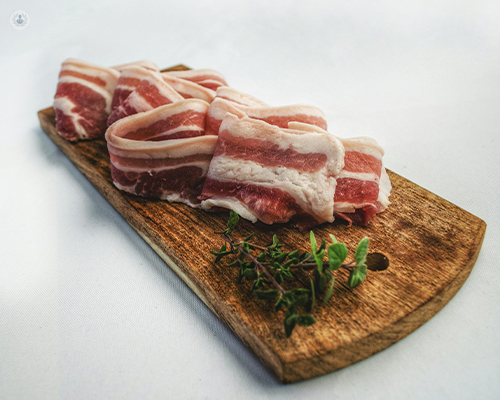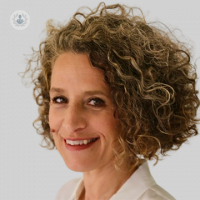How to manage cholesterol levels
Written in association with:High cholesterol levels , also known as hypercholesterolemia, mean that there is too much fat in the blood. It can be caused by eating fatty and oily foods, a lack of physical exercise, being overweight, smoking tobacco and excessively drinking alcohol. There is a genetic propensity for it. Too much cholesterol can block your veins and arteries, which can make you vulnerable to heart attacks, strokes, and cardiac diseases. There may not be symptoms, but high cholesterol can be detected with a blood test. In this article, a specialist in integrative medicine, Dr Federica Boecklin, goes over the ways in which cholesterol levels can be managed.

Cholesterol is a white-yellowish fat that is used to structure cell membranes and is also used to make vitamin D, hormones (such as testosterone and oestrogen), and bile acids. The liver actually makes all the cholesterol the body needs, and the surplus comes from what we eat and our lifestyles. Cholesterol moves throughout the body on particles of protein that can mix with the blood. These are called lipoproteins, which can be categorised as low-density (LDL) or high-density (HDL). LDL cholesterol is the “bad” kind of cholesterol because it can cling to the walls of the blood vessels, whereas HDL cholesterol is “good” because it dismantles the build-up of the LDL cholesterol.
A build-up of cholesterol in the blood vessels obstructs blood flow, which reduces the blood – and oxygen – received by the organs and tissues. Too much cholesterol can create plaque in the arteries, which will lead to atherosclerosis, Without oxygen-rich blood, parts of the body will start to fail. The heart may begin to pump faster or harder to compensate for the disruption of blood flow, which can easily escalate to coronary heart disease, a heart attack, or failure.
Anyone can have high cholesterol, but those with obesity, hypertension, and a genetic propensity to it are particularly susceptible.
Managing cholesterol with diet
If the diet is the fastest and most direct way to introduce fat into the blood, then it stands to reason that improving the diet will have a significant impact on cholesterol levels.
The unhealthy fat that causes LDL cholesterol is called saturated fat. It can be in all kinds of food – sweet, savoury, meat, dairy, and some plant oils will have them.
To avoid saturated fats, eat less of:
- Fatty cuts of meat
- Meat in general, especially sausages or mixed meat
- Butter, ghee, and lard (animal fats)
- Cheeses, particularly hard cheeses
- Creams, including ice-cream
- Microwave and stovetop popcorns (that use oils)
- Baked goods
- Palm oil
- Coconut oil and coconut cream
Unsaturated fats are better for HDL cholesterol, and will lower high cholesterol levels. They can be further categorised as monounsaturated and polyunsaturated fats, and they will have different roles in the body. Omega 3 fats are an example of an unsaturated fat.
To incorporate more unsaturated fats, eat more of:
- Oils from seeds, nuts, and vegetables (such as sunflower, oil, avocado, and rapeseed oils)
- Nuts and seeds in general
- Avocado
- Oily fishes like salmon, trout, and mackerel
The UK government recommends that about a third of daily energy should come from fat. This means that:
- Of the 90g of fat a day, men should not eat more than 30g of saturated fat
- Of the 70g of fat a day, women should not eat more than 20g of saturated fat
Managing cholesterol with exercise
It is recommended to get around three hours of physical activity a week. This can be achieved by going to the gym, but even activities as simple as walking briskly count.
Other activities can also be:
- Running and jogging
- Martial arts
- Swimming
- Cycling and skating
- Dancing
- Sports
Anything that incorporates movement and stimulates the body will be a benefit. It doesn’t have to be laborious or boring – try to find an activity that feels good to do and is enjoyable.
Smoking and alcohol use
When drunk, alcohol is broken down in the liver and rebuilt into triglycerides (another kind of fat) and cholesterol, which are then dispersed in the blood. The cholesterol obtained from alcohol, particularly red wine, is actually HDL cholesterol, but too much alcohol will still cause a build-up of the triglycerides in the liver, which can cause fatty liver disease. This renders the liver unable to function as normal, and can’t remove cholesterol from the blood, causing a rise in LDL cholesterol levels. The key is to be moderate with how much alcohol is drunk weekly, if not abstained entirely.
The effects of smoking on health can be more detrimental than those of alcohol consumption. Tobacco smoke lowers HDL cholesterol and elevates LDL cholesterol and triglycerides, as well as making the walls of the blood vessels stickier and thus easier for cholesterol to adhere to, which will create blockages.
Smoking will also make blood thicker, which obstructs the flow, and stiffens and inflames the arteries. Many healthcare professionals encourage that their patients to quit smoking entirely for their well-being.
The benefits of quitting smoking are nearly immediate:
- Within 20 minutes of quitting, blood pressure and heart rate will recover from the tobacco-induced spike.
- Within three months of quitting, blood circulation and lung function will begin to improve.
- Within one year of quitting, the risk of heart disease will be half that of a smoker.
Medications to manage cholesterol
Aside from lifestyle adjustments, some medications can be used to manage cholesterol levels, which will likely be employed if the condition of the patient is not responding to said adjustments. These include:
- Statins, which reduce the amount of cholesterol made by the liver, and help the liver remove cholesterol already in the blood. This is the most common medication prescribed for high cholesterol.
- Cholesterol absorption inhibitors, which prevent cholesterol from being absorbed in the intestine. If statins aren’t suitable for a patient, these will often be prescribed instead.
- PCSK9 inhibitors, which are potent drugs to lower LDL cholesterol levels by binding to and neutralising the protein component of a lipoprotein.
- Fibrates, which are more for lowering triglyceride levels, but can also be mildly effective against LDL cholesterol.
If you are struggling with high cholesterol and would like to explore options for management, you can consult with Dr Boecklin today via her Top Doctors profile.


